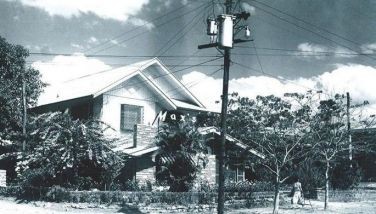Looming crisis

Even before he took his oath, Agriculture Secretary Francisco Tiu Laurel Jr. expressed doubts about available data on production and demand amid issues on agricultural products. “The problem right now is medyo incomplete ‘yung data that is available. ‘Yung data natin hindi ganun ka-accurate,” Tiu Laurel said at a media briefing.
So, he said, he is planning to reactivate the Bureau of Agricultural Statistics (BAS).
That’s basic. The President’s octogenarian caretaker of DA had apparently been giving policy recommendations to Malacanang without the benefit of accurate and granular data? That explains the topsy turvy way of managing problems with sugar, onions, and rice. It took a hard-nosed businessman like Secretary Laurel to highlight the importance of having accurate data before making decisions.
Then again, I didn’t realize the BAS needs reactivation. That means, past agriculture secretaries didn’t think they needed it. That explains why the sector is a mess, dragging down our national economic growth and causing the rise in food inflation rate.
Indeed, according to the Philippine Statistical Authority, the value of production in agriculture and fisheries decreased by 1.3 percent in the second quarter of this year.
Maybe, it is better for Laurel to funnel more resources to the PSA to gather up-to-date agricultural market data. The PSA is already staffed by competent statisticians and field data gatherers so that they don’t have to start hiring and re-training BAS staff.
The PSA is already generating market data, including agricultural, required for timely monitoring of our inflation and GDP growth rates, among other macroeconomic numbers. Just enhance their capability to produce better and more timely statistics with additional resources.
The Agri Secretary should also ask for funds to modernize our current satellite system being used to monitor rice production. A former DA Usec said we need better satellite images to more accurately know in advance how good or bad the incoming harvest will be.
Secretary Laurel should be very worried about the rice crisis that we face. Everyone I talk to in the rice industry is telling me that they are expecting problems to start escalating next month. Right now, the buying price of dry palay (unhusked rice) has exceeded P30/kg. At the rule of thumb of two kilos of palay for every kilo of milled rice, that means we will have a retail price beyond P60/kg, plus logistics and marketing costs.
Yet, last week, a spokesman of DA was quoted by PhilStar as saying that the price of locally milled rice should not exceed P48/kg. That’s silly, if not dishonest, because the same story also quotes the Samahang Industriya ng Agrikultura as saying that the farmgate price of palay is already at P31/kg.
In a briefing for the House Committee on Agriculture, DA Assistant Secretary Arnel de Mesa said prices are expected to rise in December to P48/kilo for well-milled rice and P41 to P43/kilo for regular-milled variety. The PNA, the government news agency, also reports “according to the DA’s current numbers (probably the same numbers the DA Sec said he isn’t comfortable with), the country has a rice surplus of 2.98 million MT, which is enough to last 80 days.”
The new Agri Secretary must tell his people not to confuse the public and raise expectations the government cannot deliver. Credibility is important.
The DA must now start telling the public that El Niño is likely to give us problems and we have to stop wasting rice. PhilRice estimated that we waste P7.2 billion worth of rice yearly. The proposal to require restaurants to serve half the usual cup of rice and no more unli rice is a good way of demonstrating to the public we have a problem, and everyone must help mitigate the bad effects.
Pretty obvious is the reality that contrary to government claims, the current harvest produced much less than expected. Farmers used less fertilizer because they couldn’t afford the higher price following the Ukraine war. Government fertilizer assistance came after the planting started. There were also reported pest attacks. And, of course, the weather.
But the big problem that should worry Secretary Laurel is something I have been writing about… failure to make timely importations. Unlike Indonesia, which gave an order to import over a million tons at any price, our private importers were reported to have cancelled their orders when the prices went up. Perhaps, if the tariff was cut or removed, our traders may have taken some risk importing.
On importations, the hands of Secretary Laurel are tied because the government cannot import. His best bet is to talk to San Miguel, URC, and SM, among other conglomerates, and ask them to import enough to have a decent in-country stock to control the greed of local traders. SMC can import as bulk cargo, not in sacks, and its receiving and storage facilities are world-class… temperature and humidity controlled to keep rice fresh for months if not years.
Forget rice smugglers for the meantime. Going after them is just a distraction used as an excuse to explain failure. If there are, indeed, smugglers, they add to the in-country stock and help relieve shortage. They see a market need, and they see the profits that a rice shortage brings.
Secretary Laurel should convince the President to suspend the tariff once Congress goes on Christmas recess to provide an incentive for conglomerates and other traders to import. Without imports, a supply crisis may happen. That’s politically dangerous.
Also, the tariff can be used to flush out hoarded inventory. By lowering tariffs at some point, traders will be forced to let go of inventory being held to speculate.
It is also good that Sec. Laurel is warning rice importers to import within 30 days or have their import permits cancelled. The government is entitled to know how much stock is arriving so contingency measures can be taken. The importers are probably waiting for the tariff to be lifted.
PNA reports “the total rice imports are projected at 2.86 million MT – barring additional imports in the coming weeks – down one million MT from 2022 levels.”
Secretary Laurel must be decisive because a rice crisis can destroy his boss.
Boo Chanco’s email address is bchanco@gmail.com. Followhim on X or Twitter @boochanco
- Latest
- Trending



























